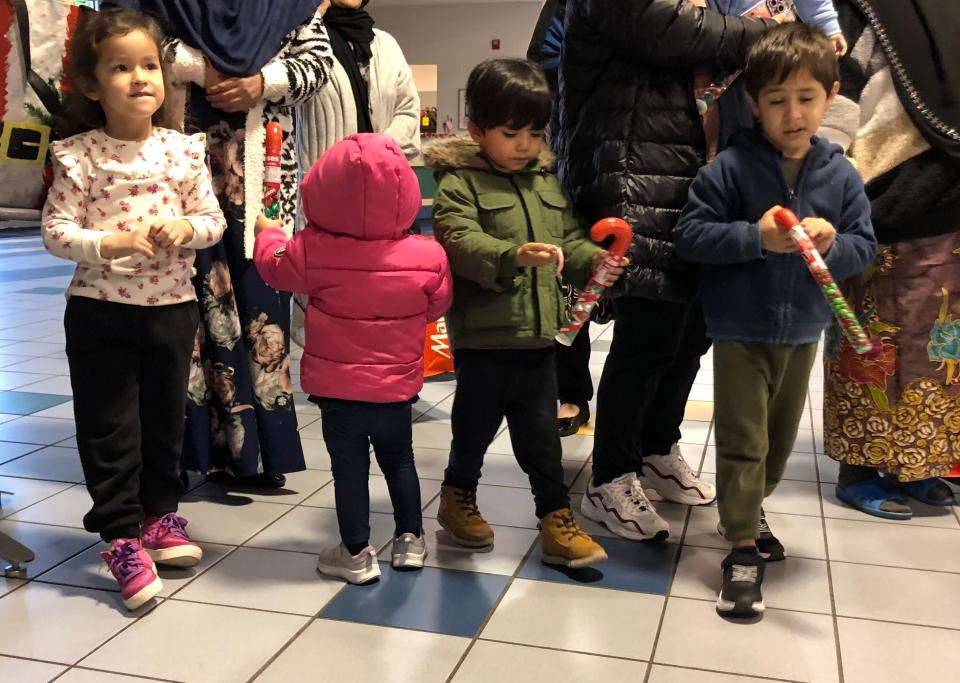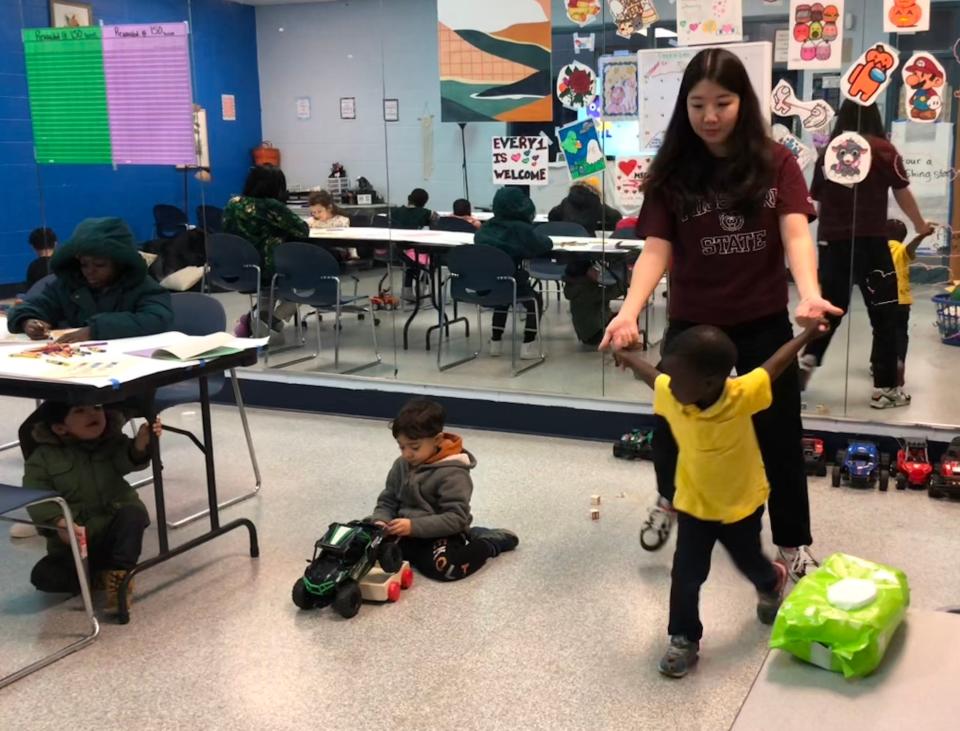Springfield organizations partner to make learning English easier for refugee parents
Christmas came early — Wednesday morning, to be exact — for a group of refugees at Springfield's Stalnaker Boys and Girls Club.
About 20 women and their children, plus a couple of husbands, received gifts not from Santa Claus but Springfield Public Schools Superintendent Grenita Lathan. Some of the women, incredulous that they had gifts of their own, were as excited as their young children.
The women take English classes in the mornings at the Stalnaker unit and while they're learning, MSU graduate students watch their children. The English classes are free, as is the transportation. For many, cost, childcare and transportation can be a huge barrier to attending English classes.

The program is a partnership between Missouri State University's English Language Institute, Springfield Public Schools, the Boys and Girls Club of Springfield and the International Institute of Southwest Missouri.
Each organization brought a piece to the table: SPS received a grant through the Office of Refugee Resettlement to enable the program development; MSU's English Language Institute had a similar program but was unable to run it during the day time or offer childcare; the Stalnaker Boys and Girls Club had space that wasn't being utilized in the morning and the IISMO provided transportation.
Merica Clinkenbeard, who has a doctorate in education and is the director of English language development with SPS, was thrilled to see how the community came together.
"It is the epitome of a true community partnership," Clinkenbeard said. "When we have all these entities coming together and working together for something this good, it just shows how we can work together and make something happen."
Students include refugees from Afghanistan, Syria, Tanzania, Central African Republic
Mainly women, and a couple of men, attend the classes, which run from 8:30 a.m. to 12:30 p.m. four days a week. Most students are refugees from Afghanistan, Syria, Tanzania, Central African Republic and Iraq. A couple who immigrated from Ecuador also attends the classes, but they are more like helpers than students, MSU ELI program director Jennifer Johnston explained.
The program is split into two class levels, both geared toward beginners, according to Johnston. The lowest level is for students who don't know any English, teaching basic phrases like "My name is" or "I am from" or the English alphabet.
Most students attend every day the class is offered, Johnston said, which exposes them to 16 hours of English each week.
Ariel Pruegger is an MSU graduate student who is focusing on teaching English as a second language. In the time she's worked with the program, she's been excited to see the progress people make.
"I’ve seen a lot of progress from the first day of (students) not even being able to say 'Hello, my name is'; 'I am from,'" Pruegger said.
Clinkenbeard said that these sort of programs are gratifying.
"My favorite part is having a way to immediately meet the needs of the families and the kids. Sometimes we don’t get to see that immediacy in education. Sometimes it takes a while to see our efforts in education," Clinkenbeard said.
MSU graduate student Nnenne Ben-Ekechukwu even finds herself learning from the people she's teaching.
"Yesterday I learned how to say thank you in Iran and Afghanistan: 'Shukran,'" Ben-Ekechukwu said. "Just being able to learn something while we’re trying to teach English" is rewarding.

Learning English culture as well as language
The program teaches students as much about language as it does about U.S. culture. Clinkenbeard says it's even beneficial for the children who play in another area while their parents learn. In her experience, it can be difficult for young refugees such as kindergarteners and first graders to acclimate to the U.S. when they are put directly in a classroom. Spending time at the Boys and Girls Club is a sort of stepping stone.
"I think we’re doing that right now and using this as (a way for kids to) come here first with (their) parent, before we put (them) in the school building, so (they) feel a little bit safer," Clinkenbeard explained.
Even the gifts to the mothers served an educational purpose.
Each bag included a purse, wallet, hand sanitizer and gloves, “because we want to teach them that for women in the U.S., you need to always carry your purse and this is what you need to have in your wallet. You need to have your identification," as well as things like hand sanitizer and tissues, Clinkenbeard said.
Search continues to keep eliminating barriers, continuing program
While the program helped fill one need, it also revealed some gaps in other resources.
SPS's refugee and immigrant services coordinator, Tatiana Sanchez, has not only helped families obtain winter coats from the clothing bank, but has also ridden with students to teach them how to use the city bus system, according to Clinkenbeard. The program has also coordinated with Help Give Hope so that kids can have bicycles as a means of transportation.
"There’s just so much need ... we don’t even realize it’s needed," Clinkenbeard said. "We take so much for granted that we already have."
While the barrier to transportation has been eliminated for some, the classes are limited to who can fit on the two buses provided by the IISMO.
"We have many more families we could serve that just aren’t able to get here. I would like to find a solution — I believe everything is solvable, somehow — to getting more families than what we are currently holding," Clinkenbeard said.
Johnston said that the program always welcomes volunteers, if people are interested in helping out. There is no need for specific qualifications and if someone wants to come help, Johnston and Clinkenbeard will find a way they can.
As for the program itself, Clinkenbeard and Johnston hope not only to continue offering it but to expand it, although they are currently searching for future sources of funding.
Susan Szuch is the health and public policy reporter for the Springfield News-Leader. Follow her on X, formerly known as Twitter, at @szuchsm. Story idea? Email her at sszuch@gannett.com.
This article originally appeared on Springfield News-Leader: Springfield educators, nonprofits help refugees learn English

